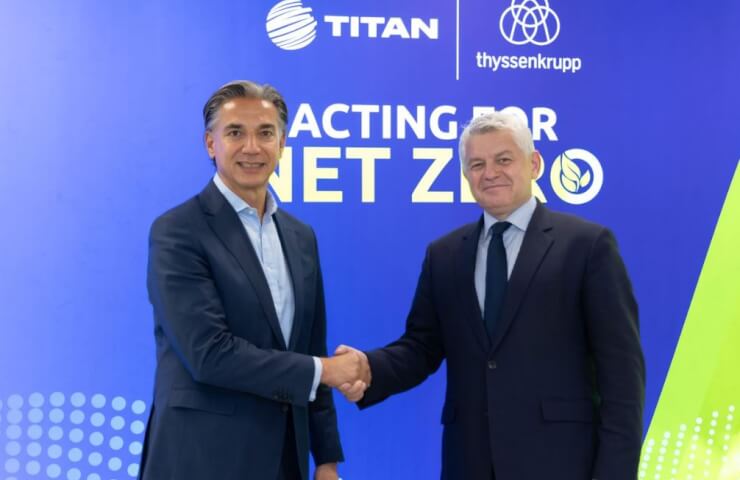Thyssenkrupp and TITAN Group have signed a front-end engineering design (FEED) contract for the IFESTOS carbon capture project in the Greek capital Athens.
IFESTOS is one of the largest carbon capture projects in Europe, enabling the production of carbon-free cement and concrete.
The signing ceremony was attended by Marcel Kobouz, CEO of TITAN Group, Samir Kairae, Chief Technical Officer of TITAN Group, Leonidas Kanellopoulos, Director of Sustainable Development and Innovation of TITAN Group, Dr. Çetin Nazikkol, Chief Strategy Officer of Thyssenkrupp Decarbon Technologies, and Christian Myland, CEO of Thyssenkrupp Polysius.
The engineering contract requires Thyssenkrupp to design and equip two kiln lines at the Kamari cement plant with oxy-fuel CO capture systems 2. Thanks to this technology, CO 2 emissions at the plant can be almost completely reduced. The plant is scheduled to reach full capacity at the end of 2029.
“Thanks to the oxy-fuel technology we have developed, the Kamari plant alone can capture about 1.9 million tons of CO 2 annually,” says the doctor. Çetin Nazikkol, Director of Strategy, Thyssenkrupp Decarbon Technologies. “This corresponds to approximately twelve percent of all greenhouse gas emissions from Greek industry. In this way, we are making a significant contribution to one of the largest CO 2 capture projects in Europe.”
The captured CO 2 is then liquefied and transported to a final storage location in the Mediterranean. This makes Thyssenkrupp's technology the starting point for the development of important CCS value chains in Southern Europe.
“We will use state-of-the-art CO 2 capture technology for our customer TITAN Group. We will plan and equip the first furnace line with proven “oxygen” technology. When modernizing the second stage of the furnace, the latest generation of this technology will be used - the “Pure Oxygen Fuel” system. Overall, we will be able to capture almost 100 percent of CO 2 emissions,” adds Christian Myland, CEO of Thyssenkrupp Polysius.
Cement is the most important building material in the world. However, global cement production also accounts for about seven percent of global CO 2 emissions. Therefore, the transition to climate-friendly processes is inevitable. With global cement production exceeding four billion tons annually, Thyssenkrupp's CO 2 capture technologies continue to have strong growth potential. Thyssenkrupp systems are already installed or provided services in approximately a third of all cement plants in the world.
The innovative CO 2 enrichment process allows the capture of CO 2. The basic principle of the Clean Oxygen Fuel technology developed by Thyssenkrupp Polysius is the separation of CO 2, generated in the kiln, from the exhaust gases of cement factories and thus preventing its release into the atmosphere. reaches. To achieve this, the combustion process uses pure oxygen instead of ambient air. When combined with downstream processing, almost 100 percent of the CO 2 emissions from cement clinker production can be captured. The separated process gas is then processed into high purity CO 2 and can then be used as a feedstock in the chemical industry or as a feedstock in other industries or alternatively stored.
Clean Oxygen Fuel technology was developed by Thyssenkrupp Polysius, one of four business units of Thyssenkrupp Decarbon Technologies. In this segment, Thyssenkrupp brings together key technologies and services to reduce CO 2 emissions for industrial customers.




